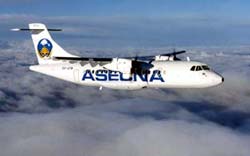A step closer to safer aviation in Africa

ASECNA aeroplane used in the trials <br>
Between 24 and 26 February, a number of trial flights into Dakar using the EGNOS (European Global Navigation Overlay Service) Test Bed system were carried out to show how the planned provision of Global Navigation Satellite System (GNSS) services over Central Africa could be implemented.
ASECNA (Agence pour la sécurité de la navigation aérienne en ASECNA (Agence pour la SECurité de la Navigation Aérienne en Afrique et à Madagascar) has worked with the European Space Agency, the European Commission and various other European partners to make these trials possible.
The Africa and Indian Ocean (AFI) States have adopted a three-phase strategy to implement GNSS for aviation in their region in the framework of the International Civil Aviation Organisation (ICAO) APIRG (AFI Planning and Implementation Regional Group).
The Dakar trials represent the first experimental test phase for the introduction of GNSS, which comprises the deployment of mobile EGNOS test stations in the AFI region to extend test signal coverage. These stations will be used to demonstrate an EGNOS service over the AFI land masses.
To provide Approach with Vertical Guidance (APV-1) navigation information is a target of the ICAO GNSS strategy and has been identified as an application of key importance for safer aviation in the region.
The Dakar trials aimed to provide an APV-1 signal in the Dakar area and to verify performance in static and dynamic conditions. To this end, a portable EGNOS test station was installed at Dakar airport and connected to the ESTB (EGNOS System Test Bed) in July last year.
An aeroplane was fitted with Test Bed User Equipment (TBUE) and an OEM4 Millennium NovAtel receiver. This equipment gave the pilots enhanced navigation information which they used to perform approaches. The EGNOS Test Bed Signal In Space provides accurate positioning data with very good availability.
This is the first time an ESTB RIMS (Ranging and Integrity Monitoring Station) has been deployed to test EGNOS services in the sub-Saharan region. Deploying the Dakar RIMS has been beneficial because it not only provides a service in the Dakar region but has enhanced the performance of the ESTB in the Mediterranean and further improved that of the ESTB in the Canary Islands. This has important implications for the provision of EGNOS services outside the European Civil Aviation Conference (ECAC) region.
In the framework of the AFI strategy, the first test bed will be installed in Central Africa and will be followed by others in Southern and Eastern Africa. More extended trials and an associated GNSS workshop, planned for May in Yaoundé, are expected to bring together all participants in the region and raise awareness of Europe’s GNSS.
Media Contact
All latest news from the category: Transportation and Logistics
This field deals with all spatial and time-related activities involved in bridging the gap between goods and people, including their restructuring. This begins with the supplier and follows each stage of the operational value chain to product delivery and concludes with product disposal and recycling.
innovations-report provides informative reports and articles on such topics as traffic telematics, toll collection, traffic management systems, route planning, high-speed rail (Transrapid), traffic infrastructures, air safety, transport technologies, transport logistics, production logistics and mobility.
Newest articles

A blueprint for mapping melting ice sheets
Researchers in the Stanford Radio Glaciology lab use radio waves to understand rapidly changing ice sheets and their contributions to global sea-level rise. This technique has revealed groundwater beneath Greenland,…

Water hyacinth plant pots – utilization of an invasive species
Together with Fiber Engineering GmbH, the DITF presents a process for the production of biodegradable plant pots. The products are cost effective and competitive. At the same time, the production…

Current research on the new 6G mobile communications standard
Nursing care robots, autonomous driving, digital twins: all of these high-tech applications will play an essential role for the new 6G mobile communications standard. The first commercial 6G networks are…



